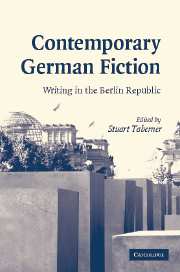Book contents
- Frontmatter
- Contents
- List of contributors
- Acknowledgments
- Note on texts and terminology
- 1 Introduction: literary fiction in the Berlin Republic
- 2 Literary debates and the literary market since unification
- 3 Berlin as the literary capital of German unification
- 4 ‘GDR literature’ in the Berlin Republic
- 5 ‘West German writing’ in the Berlin Republic
- 6 Literary reflections on '68
- 7 Pop literature in the Berlin Republic
- 8 Representations of the Nazi past I: perpetrators
- 9 Representations of the Nazi past II: German wartime suffering
- 10 German literature in the Berlin Republic – writing by women
- 11 Cultural memory and identity formation in the Berlin Republic
- 12 Turkish-German fiction since the mid 1990s
- 13 German-language writing from eastern and central Europe
- 14 Writing by Germany's Jewish minority
- Index
8 - Representations of the Nazi past I: perpetrators
Published online by Cambridge University Press: 22 September 2009
- Frontmatter
- Contents
- List of contributors
- Acknowledgments
- Note on texts and terminology
- 1 Introduction: literary fiction in the Berlin Republic
- 2 Literary debates and the literary market since unification
- 3 Berlin as the literary capital of German unification
- 4 ‘GDR literature’ in the Berlin Republic
- 5 ‘West German writing’ in the Berlin Republic
- 6 Literary reflections on '68
- 7 Pop literature in the Berlin Republic
- 8 Representations of the Nazi past I: perpetrators
- 9 Representations of the Nazi past II: German wartime suffering
- 10 German literature in the Berlin Republic – writing by women
- 11 Cultural memory and identity formation in the Berlin Republic
- 12 Turkish-German fiction since the mid 1990s
- 13 German-language writing from eastern and central Europe
- 14 Writing by Germany's Jewish minority
- Index
Summary
Considering post-unification German fiction from the perspective of its portrayal of Nazi perpetrators would seem, at first, an uncomplicated task. There are characters who could be designated as such: Hanna in Bernhard Schlink's novel Der Vorleser (The Reader, 1995), for instance, is a former concentration camp guard implicated in the killing of Jews, while the figure of the grandfather in Marcel Beyer's perplexing novel Spione (Spies, 2000) is linked with the activities of the Legion Condor during the Spanish Civil War. In another novel by Beyer, Flughunde (The Karnau Tapes, 1995), we are even treated to a portrayal of the Goebbels family and, briefly, of Hitler. In addition, we could point to characters who allow themselves to ‘slip’ into the Nazi system, become involved in supporting its ideological superstructure and lend their ideas to its racist praxis: in Flughunde, Karnau's interest in the relationship between sound and the physiology of its articulation soon meshes with Nazi Germanisation ideology, while in Jens Sparschuh's novel Der Schneemensch (The Yeti, 1993), another aspiring academic with a research interest in a supposed Ursprache – a kind of original esperanto – soon becomes embroiled in an absurd plan of the SS-Ahnenerbe (SS Ancestral Heritage Organisation) to locate and communicate with the legendary yeti in Tibet. Even the ordinary soldier has come under literary scrutiny: Uwe Timm's autobiographical, yet at the same time literary Am Beispiel meines Bruders (In My Brother's Shadow, 2003), seeks to understand the role and mentality of Timm's brother, a Waffen-SS member, during the Second World War; and Ulla Hahn's novel Unscharfe Bilder (Blurred Images, 2003) investigates the role of a father in the Wehrmacht.
- Type
- Chapter
- Information
- Contemporary German FictionWriting in the Berlin Republic, pp. 125 - 141Publisher: Cambridge University PressPrint publication year: 2007
- 1
- Cited by



